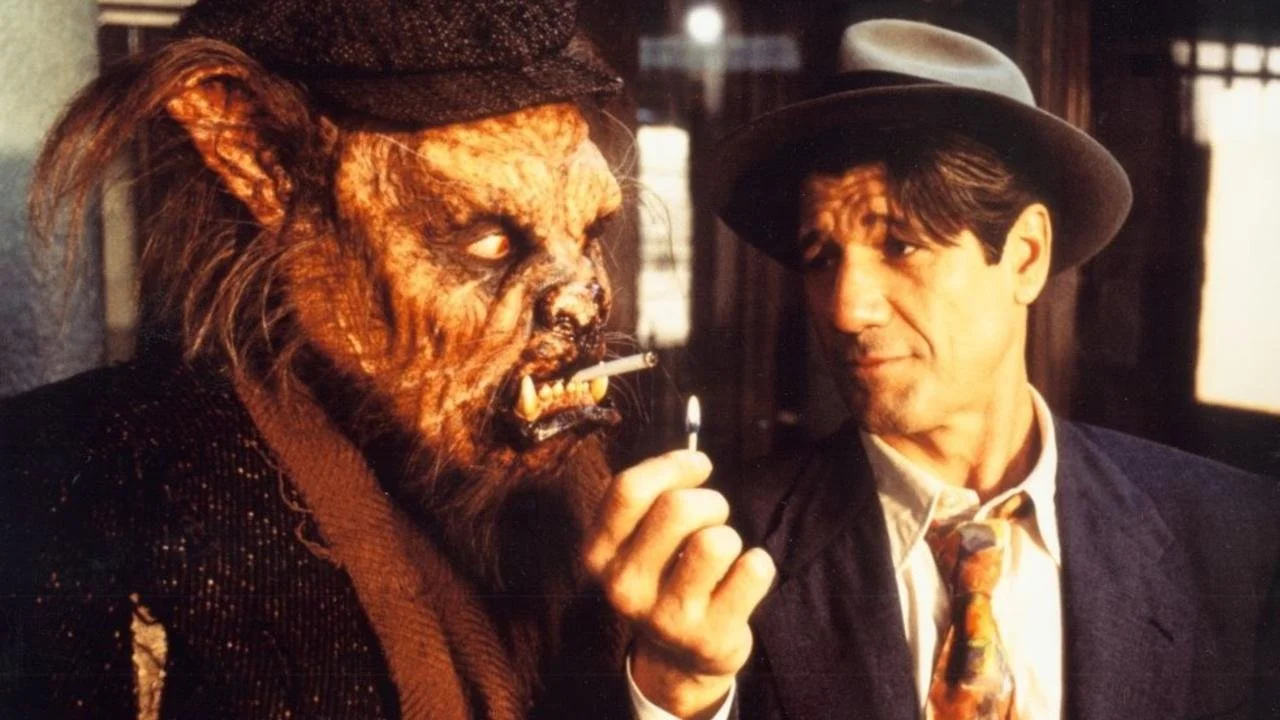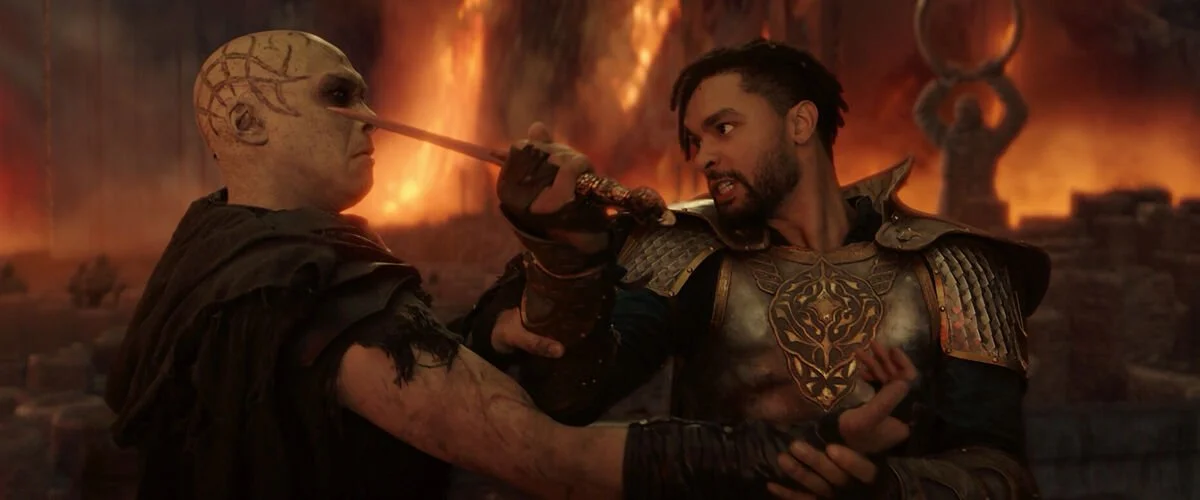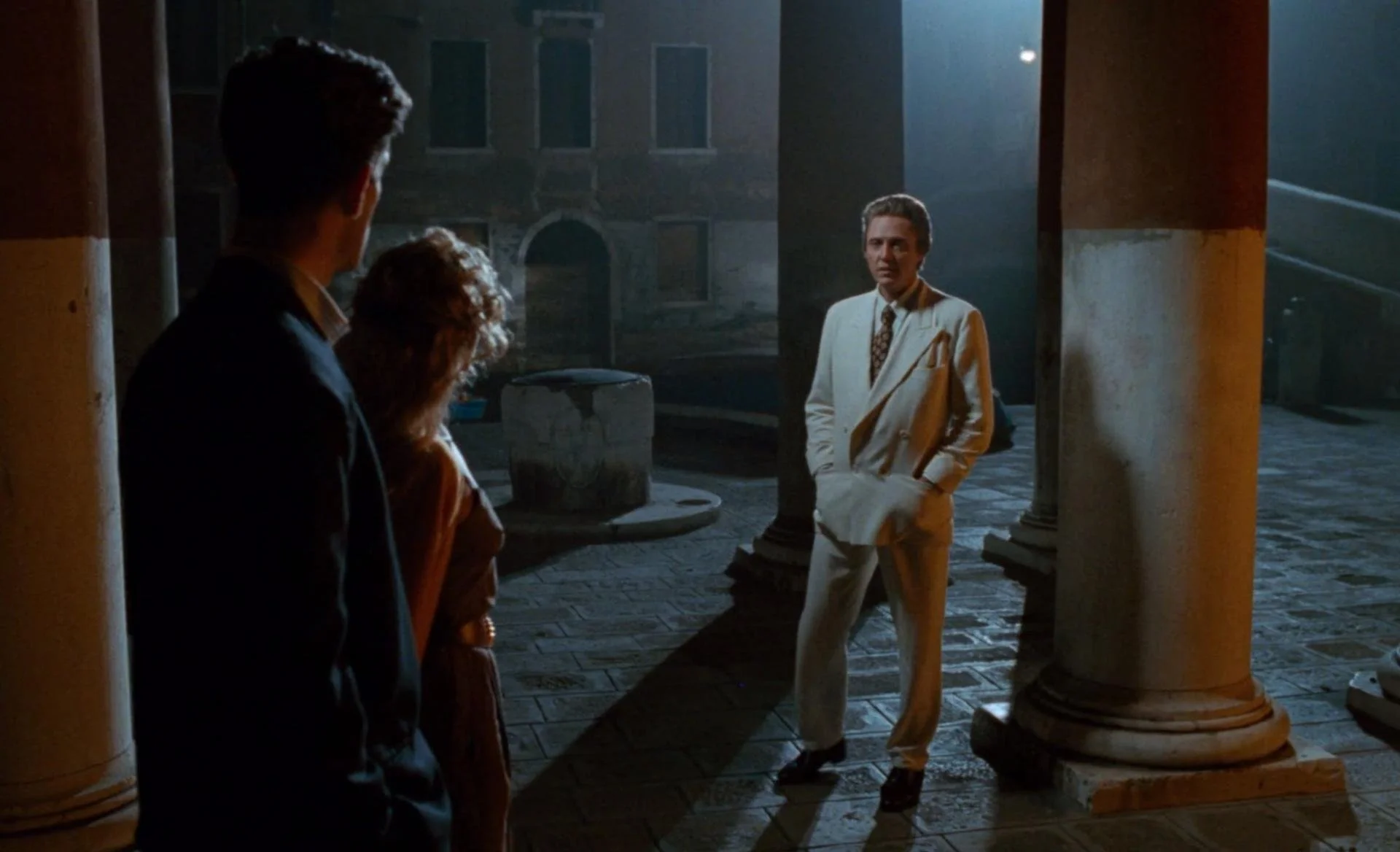MOVIE DIARY 2023: PEOPLE'LL THINK YOU NEVER BEEN HIT BY A DAME BEFORE
I ran a little longer than usual with the previous post, so these movies got bumped into this post. So let’s call this a Bonus post, why not? No special guests here, this is all me.
Cast A Deadly Spell (1991) - dir. Martin Campbell
The opening text is a killer: “Los Angeles, 1948. Everybody used magic.” It’s Los Angeles. It’s 1948. Everybody is using magic. We’re smack dab in the middle of a supernatural noir pastiche, and we’ve got all the familiar signposts— Down on his luck, shlubby, two-fisted Detective Harry Phillip Lovecraft (get it?) (Fred Ward) is seemingly the only person in the city who refuses to use magic. He’s old-school. He believes in doing things his own way because he doesn’t want to answer to anyone or owe anyone anything, and he figures that using magic is a fast track to both of those things. He’s hired by shady benefactor Amos Hackshaw (David Warner) to track down a book that was stolen from his occult collection. The book is obviously the famed Necronomicon which makes this job especially dangerous since a lot of people want to get their hands on this book and the ultimate power it’s rumored to provide. Along the way Detective Lovecraft meets the usual noir fixtures like an old flame/femme fatale (Julianne Moore), an old partner and now criminal (Clancy Brown), a complicated real estate scheme, and ass-kicking after ass-kicking.
There’s a lot of fun in here that you don’t see much of in movies today: matte-painted backgrounds, garish prosthetic makeup, practical creature effects— it’s definitely a product of 80s/early 90s aesthetics. Beyond that, though, the rest of the movie is kind of a drag. The supernatural noir thing is really fun and you can tell that the filmmakers were having a great time with peppering this world with little magical details for atmosphere and for some throwaway gags, but the main plot of the movie is pretty predictable, which makes it feel secondary to the bits about arresting a werewolf or everyone gravely examining a voodoo doll as a murder weapon or resurrecting zombies as hired muscle. There just isn’t a whole lot going on in the plot that’s very surprising, which wouldn’t be so much of a problem if what is there was done well, or if it felt like it even mattered. It feels just kind of thrown together as an afterthought to building the world of the movie.
Dungeons & Dragons: Honor Among Thieves (2023) - dir. John Francis Daley, Jonathan Goldstein
SPOILERS SPOILERS SPOILERS
I really don’t know what it is about this movie, but I had a lot of fun watching it. Firstly, it’s an anti-Olympics text, which I absolutely can get behind. Secondly, it was a lot more fun than I was expecting, which is weird because I typically don’t care for this sort of quippy geek style. I have to admit that the jokes hit, the performances are fun and sincere, everyone seems like they’re having a good time with it. Even though the style of this movie was clearly influenced by routinely tired MCU stuff, and even though it deals in decades-old fantasy storytelling conventions, it still mostly felt pretty fresh.
The freshness of this movie comes from the performances and a pretty tight, well paced screenplay. It’s fun just listening to Chris Pine joking around and being an affable, persistently positive leader. He’s funny and he delivers the comedy naturally. Every time he’d bust out the lute (was that a lute? all stringed instruments in fantasy stories are lutes as far as I’m concerned) and whip up a cheery song, it was hilarious. The rest of the crew also just fit together so well. I really liked Michelle Rodriguez’s stoic barbarian character, a great foil to Chris Pine here. The joke of her being into short kings was fun, she had an appropriately sentimental backstory, she got into some fun fights, it all worked for me. Hugh Grant is once again cast as a smarmy, untrustworthy schemer, and he’s perfect at that (Paddington 2 (2017) is maybe the most recent example? I didn’t see The Gentleman (2019) or Operation Fortune: Ruse de Guerre (2023) so I don’t know, this isn’t precise). They’re all good, but my favorite was Regé-Jean Page’s paladin character. I always think it’s comedy gold when someone shows up and starts big-dicking our main guy and everyone loves him for it, plus on top of that, the classic idea of paladins all being self-righteous sticks in the mud works so well as a counter to everyone’s sarcastic banter. That he doesn’t do jokes and he doesn’t understand jokes becomes one of the funniest recurring bits in the movie.
I never felt like any of these characters were getting lost in a script that was trying too hard to get an ironic laugh out of you. At times it really did feel like a group of friends goofing around on a D&D mission. The whole bit where Michelle Rodriguez is walking the team through her plan to tie a rope to her axe and then heave it across a lava pit so that they can safely cross is absolutely something that has come up in any D&D session. It’s bits like that where the movie toes the line between funny and annoyingly self aware. It’s not easy to do, but I think the movie does manage to land on the side of funny self awareness. I wonder if maybe that’s because while these aren’t established characters, they are representative of how actual people would play these characters in a game of D&D with their buddies. You’re not really reacting to a character in the world making some ironic comment about the world, you’re reacting to the fact that you or your buddy would have made the same comment if you were playing the game that features this world and these characters. Does that make sense? I’m not really sure that I’m explaining this right. We can talk more about it in the Discord if you want.
The Comfort of Strangers (1990) - dir. Paul Schrader
Visually, a really beautiful, lavish movie. I don’t think I’ve ever described things as “sumptuous,” but there are definitely some shots and some sets in this movie that might fit that if I didn’t feel so awkward about saying that something is “sumptuous.” It’s also an extremely weird and unsettling movie, and I’m still not sure if I liked how it all played out, but it’s definitely stuck with me. I think I’m just sort of finding it difficult to parse what sort of thing Schrader was working through with this movie? There’s some gesturing at a wrong-headed critique of feminism, but I think that’s really more of an outcropping from the more central conflict of two opposing views on masculinity, and how men must relate to women. And it’s all relayed via unnerving psychosexual machinations from Christopher Walken and Helen Mirren.
Mary (Natasha Richardson) and Colin (Rupert Everett) are a British couple on holiday in Venice. Mary is anxious because she’s left her kids behind while she goes on this romantic getaway, which is adding to the quiet tension between her and Colin. The two seem to be in a bit of a rut with their relationship, mostly because it’s unclear whether Colin likes kids, wants kids, or even really likes Mary’s kids (from a previous relationship). One late night, they have a chance encounter with Robert (Wallken), who takes them out to a bar where they all get too drunk as Robert tells them a really fucked up story about growing up with his family. Colin and Mary get so drunk they end up sleeping in an alleyway. When they wake up, extremely hungover, they again come across Robert, who insists that they come over to his home to rest and recover. They do, and when they wake up completely naked in Robert’s home (hmmm), they meet Rober't’s wife Caroline (Mirren), who explains that she undressed them so that she could wash their clothes (hmmmm). Caroline then openly talks about how attractive Mary and Colin are (hmmmmmmmmmmm), but particularly about how she and Robert both think Colin is so beautiful (HHMMMMMMMMMMMMMMMM).
Robert returns, and while Caroline takes Mary away to help her bring in the dinner, Robert and Colin have a chat where Robert talks about how his home is filled with things from a time when men were in control, and when women would defer to men, etc. etc., the usual highlights of talking to a domineering misogynist, you know. Colin makes a little spicy remark like, “So this is a museum?” to which Robert replies by punching him hard in the stomach. The women return, dinner is set, and Colin says nothing about it to Mary. The awkward dinner continues when they all discuss what England’s like these days. Mary and Colin lament the loss of freedoms in Thatcher-era England. Predictably, Robert takes the opposing view, telling the two that people need order, they need someone who’s in charge, and then insinuating that Colin is some sort of “Communist Poof.” The dinner ends there, and Mary and Colin excuse themselves, but not before Mary sees that Robert has a mysterious candid photograph of Colin, which seems to have been taken sometime before the two of them even met Robert.
The rest of the movie escalates the tension and weirdness of encountering Robert in Venice and being too polite to turn down his relentless invitations to come over and hang out and talk more about his mean father or whatever this creep wants to do. It all culminates in Robert and Caroline drugging Mary so that she can watch helplessly as they have their way with him and then kill him. All of this happened because Robert by chance caught a glimpse of Colin, and Robert and Caroline got so horny for this guy they decide to stalk him and Mary with the eventual goal of fucking and killing him. Which they did! I guess it’s always nice to share a common goal with your spouse. You gotta do things together to keep the relationship strong, and you also have to spice things up every now and then by stalking and killing a hot tourist, you know?
There’s an obvious weird sex vibe that Robert and Caroline put out there, but the violence becomes a late in the game surprise when Caroline tells Mary about how Robert likes to get rough with her in the bedroom. Her lingering and painful back injury is a result of some very hard fucking, but she’s still got the taste for more, and apparently she wants to bring other people into it, which culminates in the psychologically rich sex/death drive of the last act.
I guess this movie is about having a boyfriend who is so hot that people want to literally kill him, which is great, we love that, but it’s obviously also about power, control, men and their relationship to women. Robert is a figure of pure, male power. He’s aggressive, dominant, and he can be charming or violent, depending on what he thinks the situation calls for. He tries to model himself after how he remembers his father. Colin is more egalitarian, I suppose. He’s been dating Mary and she gets on with her kids, even if they aren’t his. He’s not as openly chauvinistic or domineering as Robert, but you can tell that he has some sort of internal conflict about whether he is being enough of a man. Firstly he seems to question if he’s less of a man if he becomes the father for another man’s children, but it’s also smaller things like him not feeling in control of his relationship with Mary, or even how he can’t even seem to find an open restaurant in Venice for date night (I’ve heard that Venice is notoriously hard to navigate, so he shouldn’t be too hard on himself for that one).
I guess the movie just kind of leaves with a grim outlook on things. No matter how enlightened you might be, in this world might makes right and you’re subject to the whims of whoever’s stronger than you. It becomes clear that Colin feels an inadequacy around Robert, which is tough for him because he knows that Robert’s philosophy is not right. While Colin may have the moral high ground, it doesn’t really get him much. He still finds himself not trying to make a scene at the dinner table after getting surprise punched by a new acquaintance, he still finds himself accepting their invitation into their home after he and Mary both obviously are creeped out by them, and he ultimately finds himself on the wrong end of Robert’s razor blade.



